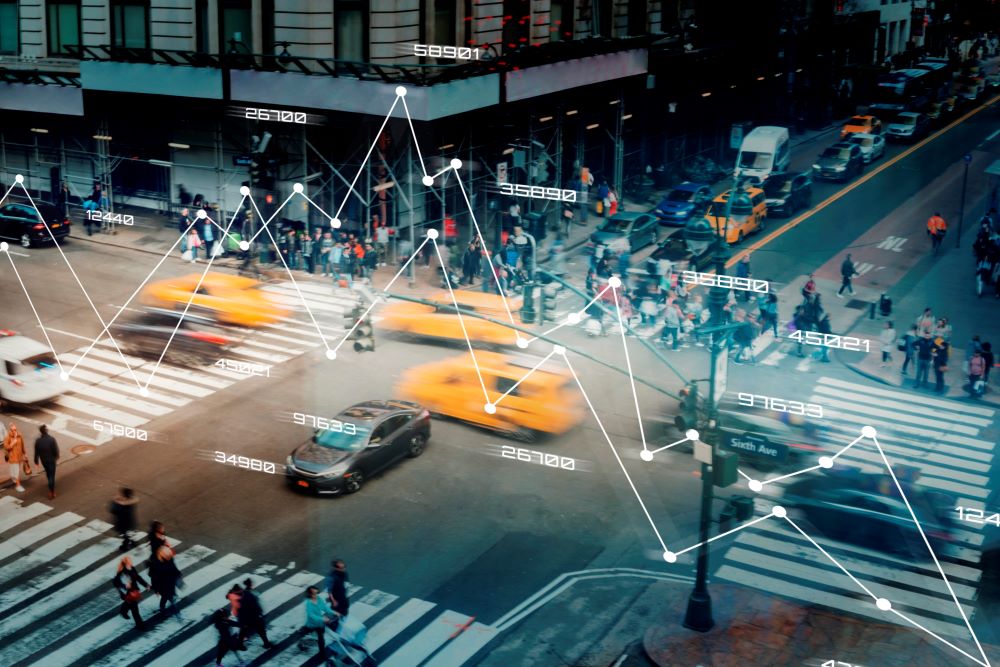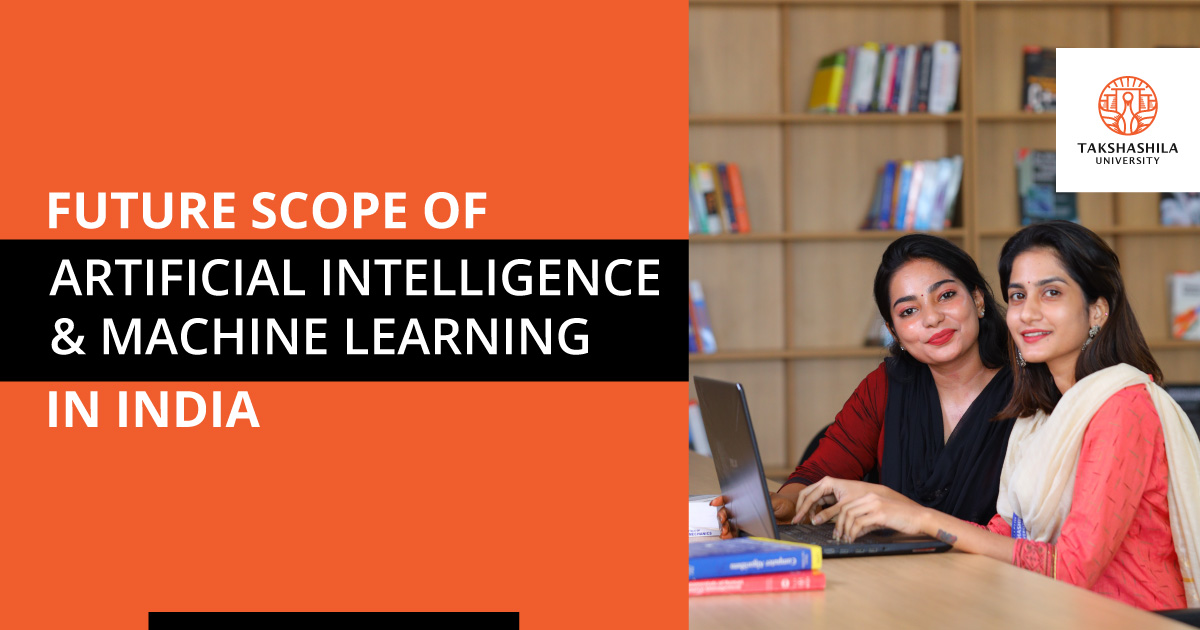Are you curious about AI and ML’s fantabulous possibilities for the country? In the space of technological advancements and digital transformations, where machines are made to think, learn and make decisions just like humans, are you wondering whether they will surpass us? Are AI and ML game-changers or threats to the human workforce?
For all your queries, we have answers in this blog. Keep reading to understand the scope of Artificial Intelligence and Machine Learning and how they impact our daily lives, society and economy.
AI includes developing computer systems to perform tasks that typically require human intelligence, such as speech recognition, visual perception, problem-solving and decision-making. AI mimics human cognitive abilities and revolutionises how we interact with technology.
ML is a subfield of AI that focuses on developing algorithms and enabling computers to learn from data and enhance performance. ML algorithms can predict and provide valuable insights for computer systems to make informed decisions.
The groundbreaking fields, Artificial Intelligence (AI) and Machine Learning (ML), are transforming industries and our lives and opening limitless possibilities for innovation. The following paragraphs let us see the future scope of AI and ML.
Enroll in the BTech CSE (AI and ML) program at Takshashila University and uncover the endless opportunities in the digital landscape.
Future Scope of Artificial Intelligence and Machine Learning
Let’s explore the future scope of AI and ML in India in the following sectors.
1. Healthcare

- Help analyse an individual’s genetic makeup, medical history and lifestyle factors and create personalised treatment plans.
- Help analyse large datasets of patients and identify patterns that could lead to an outbreak of disease.
- Help develop surgical robots to perform surgeries more precisely, requiring less human invasion.
- Help automate scheduling appointments, managing patient records, processing insurance claims, etc.
2. Agriculture

- Help create models that can predict crop yields, identify pests and diseases and optimise fertiliser and pesticide usage.
- Help collect and analyse data from various sources such as soil sensors, weather stations and satellite imagery.
- Help create robots to perform tasks such as planting, weeding, and harvesting crops to reduce labour costs and enhance efficiency.
- Help analyse the nutritional content of crops.
3. Finance

- Help financial institutions identify patterns of fraudulent activity to protect customers by analysing large datasets.
- Help assess the risk of investments and loans and make informed decisions about allocating capital.
- Help enhance customer service in a more personalised and efficient way, thus improving customer satisfaction.
- Help financial institutions comply with the rules and regulations to protect the financial system and the interests of its customers.
4. Manufacturing

- Help predict equipment failures, thus saving manufacturers’ repair costs and downtime.
- Help inspect products for defects and enhance the quality quickly.
- Help design new products that are more efficient, effective and user-friendly.
- Help manage the supply chain, from manufacturing to delivering finished products more smoothly.
5. Education

- Help create personalised learning experiences for students based on their needs and interests.
- Help automate grading for assignments, tests and exams, freeing up teachers’ time.
- Help create virtual assistants to help students find information, schedule appointments, and manage their time.
- Virtual Reality and augmented help students indulge in an immersive learning experience more engagingly and interactively.
6. Transportation

- Help revolutionise how we travel by building self-driving cars safely, efficiently and conveniently.
- Help improve traffic management by predicting traffic patterns, optimising traffic lights and arranging emergency vehicles quickly.
- Help optimise shipping routes, track shipments, and prevent cargo theft.
- Help enhance airways by predicting delays, providing personalised customer service and optimising boarding procedures.
7. Retail

- Help personalise customer experiences by recommending products, providing individual discounts, etc.
- Help detect fraudulent activities by analysing customer behaviour and transactions.
- Help automate picking and packing operations.
- Help predict demands and trends and optimise prices.
8. Cybersecurity

- Help detect cyber threats by analysing data and identifying patterns indicating malicious activities.
- Help monitor network traffic for suspicious activities.
- Help analyse user behaviour and identify anomalies in data.
- Help automate incident response.
Why should you learn Artificial Intelligence and Machine Learning?
Here’re some of the top reasons you should learn Artificial Intelligence and Machine Learning, as suggested by the faculties of Takshashila University.
- They open the door to enormous career opportunities and level up your chances of employability in the job market.
- They allow businesses to operate more efficiently and effectively and help streamline processes and improve productivity.
- They can help analyse data, identify patterns and make data-driven informed decisions based on large volumes of data.
- They help to position yourself forefront to leverage emerging technologies in the future.
- They are in-demand skills in the future as the world increasingly relies on advanced computing and automation.
- They help tackle and solve complex problems and give the ability to develop innovative solutions.
- They are applicable in diverse industries, providing the chance for flexibility and adaptability in your career.
- It opens avenues for continuous learning, self-improvement and personal growth.
Will AI and ML be a threat to the human workforce?
AI and ML technologies are designed to enlarge human capabilities and not to replace them entirely. Though there are concerns about job displacements, AI and ML create new industries and provide opportunities for innovation, collaboration and contemporary roles.
Some routine jobs may be automated, but only to allow humans to focus on more complex and creative tasks. Hence, the future scope of Artificial Intelligence and Machine Learning is not a threat to the human workforce to a significant extent!
Career Options in Artificial Intelligence and Machine Learning
Here’re the leading and exciting career paths after Artificial Intelligence and Machine Learning.
- Data Scientist
- Machine Learning Engineer
- Robotics Engineer
- AI Research Scientist
- UX Designer
- AI Ethicist
- Business Intelligence Developer
- Cloud Architect
- AI Engineer
- NLP Specialist
Begin your successful career at Takshahsila University!
Takshashila University is a famous institute in Tamil Nadu that offers undergraduate, postgraduate, and doctorate programmes. The departments are engineering, social sciences and humanities, agriculture, allied health fields, and hotel management.
It seeks to develop change-makers and world leaders by providing students with the best resources and faculties to help them become future leaders. The institute is spread across 150 acres and provides over 60 courses.
With its 10+ industrial contacts and 100% placement, the university supports students in getting placed during their last year of college through campus recruitment.
Conclusion
AI and ML’s future scope is vast and rewarding. With the tremendous growth and advancements in technology and new opportunities for innovation, the demand for AI and ML professionals is rising.
The scope of Artificial Intelligence and Machine Learning is promising, and embracing these technologies can bring immense change in areas such as healthcare, education, agriculture, etc. Hence, get ready to shape the technological future with the power of AI and ML.
FAQs
1). Are Al and ML a good career choice in India?
The increased adoption of AI and ML across various sectors and the government’s concentration on digital transformation make it a good career choice in India. With abundant career opportunities and competitive salaries, AI and ML professionals are in demand for the future.
2). What is the salary package of AI and ML-related jobs?
Though the salaries vary depending on location, skills, experience, industry and job role, the entry-level salary in the AI and ML field ranges from INR 5 to 10 lakhs per annum in India. It can hike up to INR 20 lakhs for senior-level and managerial roles.
3). Which is better, CSE or AI and ML?
Computer Science Engineering (CSE) focuses on aspects of computers, including software development and systems engineering. AI and ML emphasise advanced technologies and algorithms for data analysis and machine learning. Deciding between CSE and AI/ML depends on individual aspirations and preferences.
4). Which branch is best for AI?
Computer Science gets along well with AI since it lays a solid foundation on programming, algorithms and data structures. It gives a comprehensive understanding of the principles and concepts needed for AI development.
5). Do AI and ML require coding?
AI and ML require coding for implementing algorithms, developing models and analysing data. It also helps in customising and optimising solutions, troubleshooting issues, etc. Hence a solid foundation in programming languages such as Python, Java, or R is crucial.






